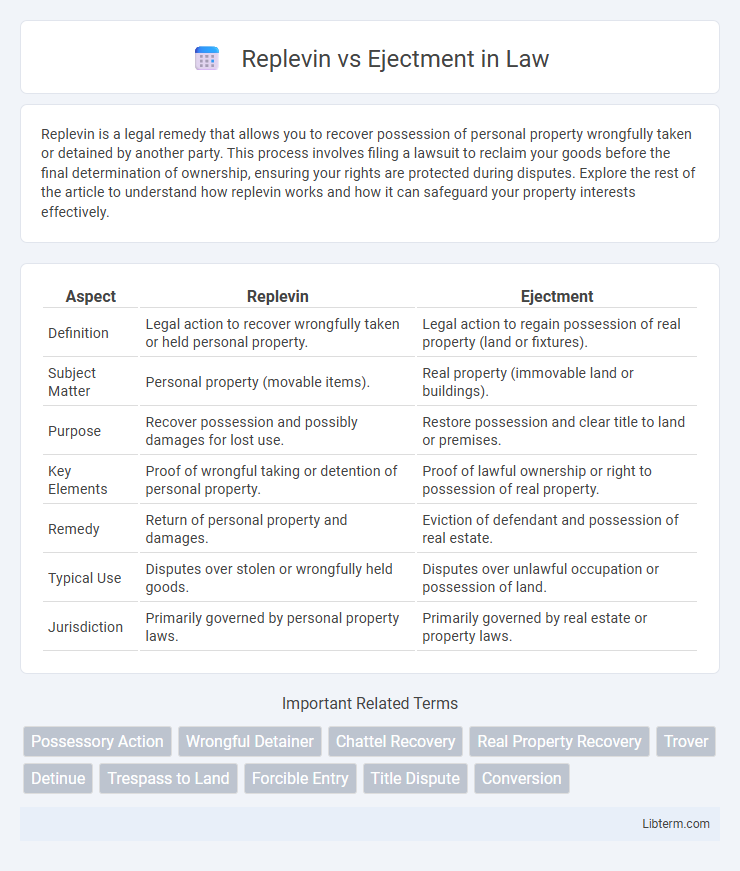Replevin is a legal remedy that allows you to recover possession of personal property wrongfully taken or detained by another party. This process involves filing a lawsuit to reclaim your goods before the final determination of ownership, ensuring your rights are protected during disputes. Explore the rest of the article to understand how replevin works and how it can safeguard your property interests effectively.
Table of Comparison
| Aspect | Replevin | Ejectment |
|---|---|---|
| Definition | Legal action to recover wrongfully taken or held personal property. | Legal action to regain possession of real property (land or fixtures). |
| Subject Matter | Personal property (movable items). | Real property (immovable land or buildings). |
| Purpose | Recover possession and possibly damages for lost use. | Restore possession and clear title to land or premises. |
| Key Elements | Proof of wrongful taking or detention of personal property. | Proof of lawful ownership or right to possession of real property. |
| Remedy | Return of personal property and damages. | Eviction of defendant and possession of real estate. |
| Typical Use | Disputes over stolen or wrongfully held goods. | Disputes over unlawful occupation or possession of land. |
| Jurisdiction | Primarily governed by personal property laws. | Primarily governed by real estate or property laws. |
Understanding Replevin: Definition and Purpose
Replevin is a legal action enabling a person to recover personal property wrongfully taken or detained by another party. Its primary purpose is to promptly return the specific item to its rightful owner rather than awarding monetary damages. This remedy is essential in cases involving tangible goods where possession and ownership disputes arise.
What Is Ejectment? Key Concepts Explained
Ejectment is a legal action used to recover possession of real property wrongfully occupied by another party, typically through unlawful entry or tenant holdover. It focuses on restoring possession rather than ownership, and the plaintiff must prove their right to possess the property and the defendant's wrongful possession. Unlike replevin, which deals with personal property, ejectment specifically addresses disputes involving real estate possession rights.
Legal Foundations: Replevin vs Ejectment
Replevin is grounded in property law as a legal remedy for the recovery of wrongfully taken or detained personal property, emphasizing the plaintiff's right to immediate possession. Ejectment, rooted in real property law, serves to recover possession of land or real estate wrongfully occupied by another party. Both actions require proving superior ownership or possessory rights, but replevin applies to chattels while ejectment targets real estate disputes.
Types of Property Involved in Each Action
Replevin actions typically involve personal property, allowing the owner to recover specific tangible items wrongfully taken or detained. Ejectment focuses on real property, providing a legal remedy for recovering possession of land or real estate from unlawful occupants. Understanding these distinctions is crucial for selecting the appropriate legal action based on whether the property in dispute is movable goods or immovable land.
Grounds for Filing Replevin vs Ejectment
Replevin is filed primarily to recover possession of personal property unlawfully taken or withheld, emphasizing the plaintiff's immediate right to possession and the property's wrongful detention. Ejectment, on the other hand, targets the recovery of possession of real property, focusing on wrongful dispossession or unlawful occupation by a defendant. The key distinction lies in replevin addressing movable goods, while ejectment concerns real estate and the rightful possession thereof.
The Legal Process: Steps and Requirements
Replevin involves filing a lawsuit to recover wrongfully taken personal property, requiring the plaintiff to prove ownership and wrongful possession, often starting with a demand for return before court action. Ejectment addresses wrongful possession of real property, necessitating proof of legal title and wrongful occupancy, typically involving a complaint, summons, and a court hearing to remove the defendant. Both processes require adherence to specific procedural rules, including timely filing, proper service of process, and presentation of evidence to establish rightful ownership or possession.
Remedies Available: Recovering Property or Possession
Replevin provides a legal remedy for recovering personal property wrongfully taken or retained, allowing the plaintiff to regain possession before a final judgment through a prejudgment writ. Ejectment seeks the restitution of real property possession, primarily addressing wrongful dispossession or trespass, often resulting in a judgment ordering the defendant to vacate the premises. Both actions focus on possession but differ in application--replevin centers on movable items while ejectment concerns real estate possession rights.
Common Defenses in Replevin and Ejectment Cases
Common defenses in replevin cases often include proving lawful ownership or possession, asserting payment or satisfaction of debt, and challenging the plaintiff's claim through due process violations. In ejectment cases, typical defenses involve demonstrating lawful title or tenancy, claiming adverse possession, or disputing the plaintiff's right to possession based on contractual agreements. Both cases require robust evidentiary support to counter the opposing party's claims effectively.
Case Law Examples: Replevin and Ejectment in Practice
In *Rogers v. Grimaldi* (9th Cir. 1989), the court emphasized possession restoration in replevin cases, focusing on wrongful holding of goods. The landmark case *Jefferson v. Hyde* (Iowa 1944) illustrated ejectment's application for recovering possession of real property wrongfully held by another party. These decisions highlight replevin's role in personal property disputes and ejectment's utility in real estate possession controversies.
Choosing the Right Action: Replevin or Ejectment?
Choosing between replevin and ejectment depends on the nature of the property dispute: replevin is suited for recovering personal property wrongfully taken or withheld, while ejectment addresses the unlawful possession or use of real estate. Replevin requires proving immediate possession of specific personal property, and the legal remedy focuses on reclaiming that property promptly. Ejectment involves establishing rightful ownership or leasehold interest in land and ejecting the wrongfully occupying party to regain possession of the real estate.
Replevin Infographic

 libterm.com
libterm.com